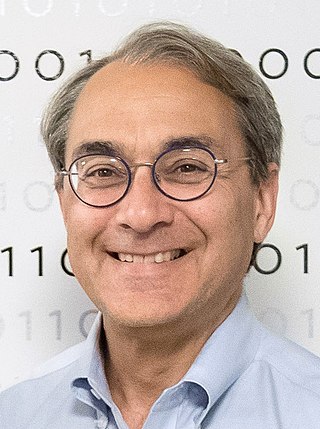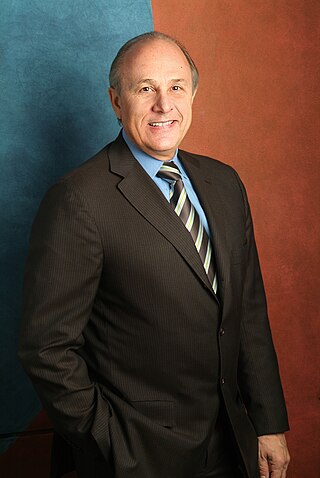Related Research Articles

A patent is a type of intellectual property that gives its owner the legal right to exclude others from making, using, or selling an invention for a limited period of time in exchange for publishing an enabling disclosure of the invention. In most countries, patent rights fall under private law and the patent holder must sue someone infringing the patent in order to enforce their rights.
Radio-frequency identification (RFID) uses electromagnetic fields to automatically identify and track tags attached to objects. An RFID system consists of a tiny radio transponder called a tag, a radio receiver, and a transmitter. When triggered by an electromagnetic interrogation pulse from a nearby RFID reader device, the tag transmits digital data, usually an identifying inventory number, back to the reader. This number can be used to track inventory goods.

Kettering University is a private university in Flint, Michigan. It offers bachelor of science and master’s degrees in STEM and business fields. Kettering University undergraduate students are required to complete at least five co-op terms to graduate.

BlackBerry Limited is a Canadian software company specializing in cybersecurity. Founded in 1984, it developed the BlackBerry brand of interactive pagers, smartphones and tablets. The company transitioned to providing software and services and holds critical software application patents.

The Berkeley Open Infrastructure for Network Computing is an open-source middleware system for volunteer computing. Developed originally to support SETI@home, it became the platform for many other applications in areas as diverse as medicine, molecular biology, mathematics, linguistics, climatology, environmental science, and astrophysics, among others. The purpose of BOINC is to enable researchers to utilize processing resources of personal computers and other devices around the world.

The New York University Tandon School of Engineering is the engineering and applied sciences school of New York University. Tandon is the second oldest private engineering and technology school in the United States.

Near-field communication (NFC) is a set of communication protocols that enables communication between two electronic devices over a distance of 4 centimetres (1.6 in) or less. NFC offers a low-speed connection through a simple setup that can be used for the bootstrapping of capable wireless connections. Like other proximity card technologies, NFC is based on inductive coupling between two electromagnetic coils present on a NFC-enabled device such as a smartphone. NFC communicating in one or both directions uses a frequency of 13.56 MHz in the globally available unlicensed radio frequency ISM band, compliant with the ISO/IEC 18000-3 air interface standard at data rates ranging from 106 to 848 kbit/s.

The University of Wisconsin–Stout is a public university in Menomonie, Wisconsin. A member of the Universities of Wisconsin, it enrolls more than 9,600 students. The school was founded in 1891 and named in honor of its founder, lumber magnate James Huff Stout.

Mark Jonathan Pincus is an American Internet entrepreneur known as the founder of Zynga, a mobile social gaming company. Pincus also founded the startups Freeloader, Inc., Tribe Networks, and Support.com. Pincus served as the CEO of Zynga until July 2013, then again from 2015 to 2016.

Avery Dennison Corporation is a multinational manufacturer and distributor of pressure-sensitive adhesive materials, apparel branding labels and tags, RFID inlays, and specialty medical products. The company is a member of the Fortune 500 and is headquartered in Mentor, Ohio.
Kenneth Irvine Chenault is an American business executive. He was the CEO and Chairman of American Express from 2001 until 2018. He became the third African American CEO of a Fortune 500 company. He is currently the Chairman of the global venture capital firm, General Catalyst.
In patent law, a patent pool is a consortium of at least two companies agreeing to cross-license patents relating to a particular technology. The creation of a patent pool can save patentees and licensees time and money, and, in case of blocking patents, it may also be the only reasonable method for making the invention available to the public. Competition law issues are usually important when a large consortium is formed.
Google.org, founded in October 2005, is the charitable arm of Google, a multinational technology company. The organization has committed roughly US$100 million in investments and grants to nonprofits annually.

Alfred Zalmon Spector is an American computer scientist and research manager. He is a visiting scholar in the MIT EECS Department and was previously CTO of Two Sigma Investments. Before that, he was Vice President of Research and Special Initiatives at Google.
The involvement of the public in patent examination is used in some forms to help identifying relevant prior art and, more generally, to help assessing whether patent applications and inventions meet the requirements of patent law, such as novelty, inventive step or non-obviousness, and sufficiency of disclosure.

The Linux Foundation (LF) is a non-profit organization established in 2000 to support Linux development and open-source software projects. In addition to providing a neutral home where Linux kernel development can be fostered, the LF is dedicated to building sustainable ecosystems around open-source projects to accelerate technology development and encourage commercial adoption.

Omni-ID is a vendor of passive UHF Radio-frequency identification (RFID) tags. Founded in 2007 as Omni-ID, Ltd., its products are a range of RFID tags designed to operate in all environments, including on metal and liquids.

Murray D. Martin is the former Chairman, President and Chief Executive Officer of the U.S.-based Pitney Bowes. In 2007, he was appointed CEO to succeed Michael J. Critelli. Martin joined Pitney Bowes in 1987 and is best known for Pitney Bowes’ transformation from an American company selling goods and services into a global company.
A human microchip implant is any electronic device implanted subcutaneously (subdermally) usually via an injection. Examples include an identifying integrated circuit RFID device encased in silicate glass which is implanted in the body of a human being. This type of subdermal implant usually contains a unique ID number that can be linked to information contained in an external database, such as identity document, criminal record, medical history, medications, address book, and other potential uses.
Rajit Gadh is a Professor of Mechanical and Aerospace Engineering at the UCLA Henry Samueli School of Engineering and Applied Science and the founding director of the UCLA Smart Grid Energy Research Center (SMERC), the UCLA Wireless Internet for Mobile Enterprise Consortium (WINMEC), and the Connected and Autonomous Electric Vehicles Consortium (CAEV).
References
- ↑ "Lawrence J. Ellison - Executive Bio, Compensation History, and Contacts - Equilar Atlas". People.equilar.com. Archived from the original on 2015-06-20. Retrieved 2017-08-19.
- ↑ "VeriTeQ Corp. (VTEQ): Mario Cardullo's device, patented on January 23, 1973". Archived from the original on 2015-06-20. Retrieved 2015-06-19.
- ↑ "RFID: OPPORTUNITIES and CHALLENGES Yize Chen. History In 1969, Mario Cardullo presented a RFID business plan to investors. The application areas include: - ppt download". Slideplayer.com. Retrieved 2017-08-19.
- ↑ "NFCNEARFIELDCOMMUNICATION.ORG - The Invention of RFID and the Contributions of CHARLES WALTON". Nfcnearfieldcommunication.org.
- ↑ "History of RFID - Global Venture". Globalventurelabels.com. Retrieved 2017-08-19.
- ↑ "Who Invented RFID: Industry or Academia?". Aetherczar.com. 16 January 2011. Retrieved 2017-08-19.
- ↑ [ dead link ]
- ↑ "#331 Polytechnic Institute of NYU". Forbes.com. Retrieved 2017-08-19.
- ↑ "News at Mason - George Mason". Newsdesk.gmu.edu. Retrieved 2017-08-19.
- ↑ "Genesis of the Versatile RFID Tag". 21 April 2003. Archived from the original on June 17, 2013.
- ↑ "The History of RFID Technology". 16 January 2005. Archived from the original on April 4, 2013.
- ↑ "Mario W. Cardullo". Archived from the original on 2015-06-20. Retrieved 2015-06-19.
- ↑ "Interview with Mr. Mario Cardullo". Insme.org. Archived from the original on 2017-08-14. Retrieved 2017-08-19.
- ↑ "History - IST432_SP10_TEAM15 - Confluence". Wikispaces.psu.edu.
- ↑ "RFID: OPPORTUNITIES and CHALLENGES Yize Chen. History In 1969, Mario Cardullo presented a RFID business plan to investors. The application areas include: - Documents". Docslide.us. Retrieved 2017-08-19.